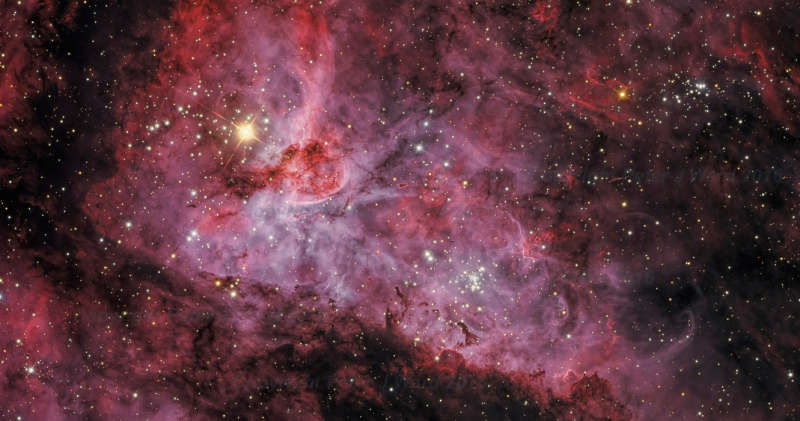Credit & Copyright: Peter Ward (Barden Ridge Observatory)
Explanation:
A jewel of the southern sky, the
Great
Carina Nebula, also known as NGC 3372, spans over 300 light-years,
one of our galaxy's largest star forming
regions.
Like the smaller, more northerly
Great Orion Nebula, the
Carina Nebula is easily visible to the
unaided eye, though at a distance of 7,500
light-years it is some 5 times farther away.
This
gorgeous telescopic close-up
reveals remarkable details of the region's central glowing filaments of
interstellar gas
and obscuring cosmic dust clouds.
The field of view is over 50 light-years across.
The Carina Nebula is home to young, extremely massive stars, including
the stars of open cluster
Trumpler 14
(below and right of center) and the still enigmatic variable
Eta Carinae, a
star with well over 100 times the mass of the Sun.
Eta Carinae is the brightest star, seen here
just above
the dusty Keyhole Nebula (NGC 3324).
While Eta Carinae itself maybe on the verge of a supernova explosion,
X-ray images indicate that the Great Carina Nebula
has been a veritable
supernova
factory.
1999 2000 2001 2002 2003 2004 2005 2006 2007 2008 2009 2010 2011 2012 2013 2014 2015 2016 2017 2018 2019 2020 2021 2022 2023 2024 2025 2026 |
Yanvar' Fevral' Mart Aprel' Mai Iyun' Iyul' Avgust Sentyabr' Oktyabr' Noyabr' Dekabr' |
NASA Web Site Statements, Warnings, and Disclaimers
NASA Official: Jay Norris. Specific rights apply.
A service of: LHEA at NASA / GSFC
& Michigan Tech. U.
|
Publikacii s klyuchevymi slovami:
Eta Carinae - Eta Kariny - Eta Kilya - tumannost' Kilya - tumannost' Zamochnaya skvazhina
Publikacii so slovami: Eta Carinae - Eta Kariny - Eta Kilya - tumannost' Kilya - tumannost' Zamochnaya skvazhina | |
Sm. takzhe:
Vse publikacii na tu zhe temu >> | |
